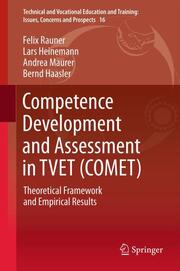Detailansicht
Competence Development and Assessment in TVET (COMET)
Theoretical Framework and Empirical Results, Technical and Vocational Education and Training: Issues, Concerns and Prospects 16
Rauner, Felix/Heinemann, Lars/Maurer, Andrea et al
ISBN/EAN: 9789400747241
Umbreit-Nr.: 3423310
Sprache:
Englisch
Umfang: xviii, 170 S.
Format in cm:
Einband:
gebundenes Buch
Erschienen am 25.07.2012
Auflage: 1/2012
- Zusatztext
- The transferability of vocational education and training qualifications across international borders is a live issue in this heterogeneous field. Key to this goal is defining a common methodology for measuring vocational competences. This publication sets out a proposal for just that, based on the results of a pilot project known as 'COMET' on competence diagnostics in the field of electrical engineering. The study deploys longitudinal analysis to explore issues of competence development, the development of vocational identity, and occupational commitment. It focuses on two discrete occupational profiles in electrical engineering in an ambitious test of a model currently applied to other professions as well. The model's success in its first phase is detailed in the second part of the volume, where the authors show that the transfer of the competence framework into an empirical model was successful. They also demonstrate that the methodology can be applied to designing and evaluating vocational education and training processes, making the material relevant to VET teachers and trainers as well as academics. With its first section comprising a full description of the theoretical framework, this book is a significant step forward in an urgent task facing administrations, labor forces and employers around the world. The achievement is in proportion to the notorious complexities of a field whose diversity makes tough demands on large-scale methods of assessment.
- Kurztext
- The transferability of vocational education and training qualifications across international borders is a live issue in this heterogeneous field. Key to this goal is defining a common methodology for measuring vocational competences. This publication sets out a proposal for just that, based on the results of a pilot project known as 'COMET' on competence diagnostics in the field of electrical engineering. The study deploys longitudinal analysis to explore issues of competence development, the development of vocational identity, and occupational commitment. It focuses on two discrete occupational profiles in electrical engineering in an ambitious test of a model currently applied to other professions as well.The model's success in its first phase is detailed in the second part of the volume, where the authors show that the transfer of the competence framework into an empirical model was successful. They also demonstrate that the methodology can be applied to designing and evaluating vocational education and training processes, making the material relevant to VET teachers and trainers as well as academics. With its first section comprising a full description of the theoretical framework, this book is a significant step forward in an urgent task facing administrations, labor forces and employers around the world. The achievement is in proportion to the notorious complexities of a field whose diversity makes tough demands on large-scale methods of assessment.
- Autorenportrait
- InhaltsangabePreface.- Introduction: Competence Diagnostics in Vocational Education - what for?.- Foundations of a competence model.- The COMET competence model: foundations for the study of professional competence and identity.- Test development and design of the study.- Test instruments and implementation of the COMET study.- Results 2008 - the survey population.- Results 2008 - Apprentices competence.- Results of the main phase.- The COMET rating procedure in practice: some conclusions.- References.
- Schlagzeile
- InhaltsangabePreface.- Introduction: Competence Diagnostics in Vocational Education - what for?.- Foundations of a competence model.- The COMET competence model: foundations for the study of professional competence and identity.- Test development and design of the study.- Test instruments and implementation of the COMET study.- Results 2008 - the survey population.- Results 2008 - Apprentices competence.- Results of the main phase.- The COMET rating procedure in practice: some conclusions.- References.
